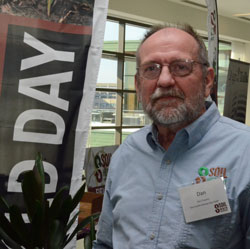 The Soil Health Partnership knows that further research is needed to show farmers the benefits of soil health. Dan Towery, Field Manager with the Soil Health Partnership in Indiana, spoke with Chuck Zimmerman at the Soil Health Summit this week in Indianapolis about the purpose of the Summit as well as the field research trials they are currently conducting.
The Soil Health Partnership knows that further research is needed to show farmers the benefits of soil health. Dan Towery, Field Manager with the Soil Health Partnership in Indiana, spoke with Chuck Zimmerman at the Soil Health Summit this week in Indianapolis about the purpose of the Summit as well as the field research trials they are currently conducting.
“We’re going to discuss with growers, university folks, and folks from the private sector, this whole idea of soil health,” said Towery. “We’re looking at the whole gamut; the agronomic, the economic, and the environmental pieces and how they all fit together. The whole idea is to give growers the assistance that they need to make some of these changes in their production.”
With commodity prices being low, growers are looking at how to best manage costs while keeping inputs low, and Towery acknowledged that there can be added expenses when focused on improving soil health, but there is also opportunity and money to be made.
The Soil Health Partnership has multiple demo farms where they have replicated strip plots in partnership with local growers. The growers decide what they want to compare. Typically, most are looking at a conventional tillage system compared to no-till with cover crops. Over a 5 year effort, SHP will track inputs and management decisions and by the end, SHP hopes to be able to show that farmers increased their profit margins and relate it back to what happened in the soil. An example of factors they will be monitoring are increasing the active organic matter portion and improving filtration.
Field-size strip plots and weather inconsistencies allow for error in a given year; devoting five years to the replicated research projects will allow for a better synopsis of the impact of soil health. The demo fields are from 20 to 80 acres in size with 8 strips total, 4 control and 4 adaptive management.
Learn more in this interview: Interview with Dan Towery, Soil Health Partnership
